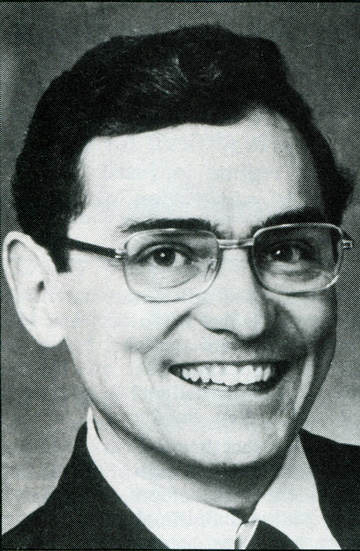The views expressed in our content reflect individual perspectives and do not represent the authoritative views of the Baha'i Faith.
Have you ever met anyone who focused and aligned all of their energies on a profoundly altruistic, humanitarian goal, who dedicated their entire life to the service of humanity?
It’s an inspiring, life-altering event when you do. I’ve talked to people who met and spoke to Gandhi, Mother Teresa, Dr. Martin Luther King, Jr. and Abdu’l-Baha; and they all remember how those remarkable human beings expanded their horizons, deeply touched their hearts and literally altered the course of their existence. They seem completely and fully alive, overflowing with the vitality of a heavenly spirit, radiant and bursting with energy and hope and love:
When a soul has in it the life of the spirit, then does it bring forth good fruit and become a Divine tree. I wish you to try to understand this example. I hope that the unspeakable goodness of God will so strengthen you that the celestial quality of your soul, which relates it to the spirit, will for ever dominate the material side, so entirely ruling the senses that your soul will approach the perfections of the Heavenly Kingdom. May your faces, being steadfastly set towards the Divine Light, become so luminous that all your thoughts, words and actions will shine with the Spiritual Radiance dominating your souls, so that in the gatherings of the world you will show perfection in your life… Men should hold in their souls the vision of celestial perfection, and there prepare a dwelling-place for the inexhaustible bounty of the Divine Spirit.
Let your ambition be the achievement on earth of a Heavenly civilization! I ask for you the supreme blessing, that you may be so filled with the vitality of the Heavenly Spirit that you may be the cause of life to the world. – Abdu’l-Baha, Paris Talks, pp. 98-99.

Dan Jordan
Because we rarely encounter such altruistic, soulful individuals, they have a profound impact on us when we meet them. Dan Jordan had that kind of impact on me.
I only met Dan a handful of times, and only really had extended conversations with him twice. But somehow, his spirit truly inspired me. I think he generated such a powerful impact on others because he possessed that joyful, selfless ethic of service to humanity that characterizes the most developed, the most serious and the most spiritual people.
Don’t misunderstand me, though—Dan wasn’t a dour, severe person in any way. He had tremendous happiness and humor about life. Constantly smiling and laughing, his spirit seemed completely free, unconcerned about any difficulties and problems. Instead, Dan committed his whole being to the education of the human race.
As a Baha’i, Dan believed in the emergence of a new, universal global culture, which he felt he could best serve and help bring about as an educator. In 1965 Dan became the Director of the Institute for Research in Human Behavior at Indiana State University in Terre Haute, where he ran the Upward Bound Program for disadvantaged high school students. In 1968 he joined the faculty at the University of Massachusetts, Amherst as the director of the Center for the Study of Aesthetics in Education, the director of the Tutorial Program for Minority Students, and the director of the Comprehensive Study of Compensatory Education in Massachusetts.
Three years later, Dan co-founded the Center for the Study of Human Potential at U. Mass. Along with other Baha’i educators and scholars, he started the Anisa Project, a comprehensive, Baha’i-inspired educational system organized around a philosophical base. With the creation of the Anisa (Arabic for the Tree of Life) Project—adopted by dozens of school systems during Jordan’s lifetime—Dan had begun to realize his dream of unleashing human potential through a new way of educating children and youth.
Initially conceptualized and constructed at the University of Massachusetts while Jordan worked there as a professor, the Anisa Educational Model, inspired by the Baha’i teachings and the philosophical work of Alfred North Whitehead, soon grew into a national movement that trained hundreds of educators.
Dan conceptualized this new educational model as a process, rather than a fixed formula. Based on the constantly-evolving empirical framework of the biological and medical sciences, The Anisa Model gathered and unified educational practice and theory into a completely new paradigm:
At the present time the world of humanity and the different cultures it represents are in the midst of the most extensive crises ever known to man. The ways we have learned to feel, think, and act are no longer functional…. These crises are forcing humanity to seek a new culture, one that is universal and therefore functional for all men everywhere; one that can create a new race of men, new social institutions, and new physical environments. – Dan Jordan
Dan’s deep spiritual life affected everything he did. A great deal of the inspiration for the Anisa Model came from the Baha’i teachings. Dan Jordan and his colleague and collaborator Don Streets, both Baha’is, believed in the emergence of a new, universal global culture, and designed the Anisa Model to educate children and youth from all cultural backgrounds.
“We invite scholars to examine thoroughly the philosophical basis of the Anisa Model of education,” Dr. Streets said recently, “as well as its comprehensive theory of development, along with the theories of pedagogy, curriculum, evaluation, and administration that derive from its all-embracing philosophy—as a breakthrough in not only understanding the essential nature of human beings, but also in rescuing educational practice from the vagaries, uncertainties, and erroneous effects of tradition and opinion.
“The Anisa Model progressively moves education onto a sound trajectory of responsible improvement that eventually can warrant education and educational practice justifiably being called a science,” Streets said. “I believe that Dan Jordan’s contribution to an understanding of human development and its import for education will more than equal the great scholarly contributions of Descartes, Galileo, Einstein, and others who had to fight their way to getting their incredible breakthroughs in knowledge known, understood, and eventually appreciated by humanity.”
Next: Becoming Your True Self by Knowing and Loving
















Comments
Sign in or create an account
Continue with Googleor